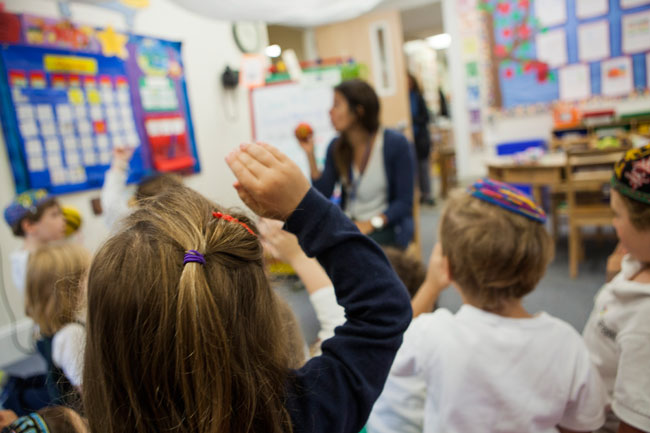Opinion
A READER RESPONDS
The ROI of funding Jewish schools
While the shocking events of Oct. 7 through the present day feel all-consuming and devastating, reading the resonant ideas presented in “The ROI of funding Jewish communal infrastructure in a post-Oct. 7 world” (eJewishPhilanthropy, Dec. 11, 2023) was a joyous experience. Philanthropists who have the foresight to invest in infrastructure for our important communal endeavors — and professionals and lay leaders who find solace and support in the wisdom of our ancient yet relevant texts because of that structure — give me so much hope. Having adult learners connect more deeply to the people with whom they study is priceless. After all, finding meaning in the text and in the community is what has held the Jewish people together since Mount Sinai.
Children are rewarded by the experiences of learning text and creating connections just as much as the adults mentioned in the article. Inspired children will also become the kind of adults who independently pick up a sefer (Jewish book) or seek out a study partner. This exchange of ideas and esprit de corps is what builds community and a robust and bright future for the Jewish people.

With the vision and support of the Mayberg Foundation, the Jewish Education Innovation Challenge was established over 10 years ago to invigorate educational environments with new ways of teaching and learning. JEIC staff members both design new initiatives and identify and promote existing models that uniquely engage students in text study, an activity that also connects them to themselves, their communities and God. We at JEIC posit that the elements mentioned in Rabbi Ana Bonnheim and Avidan Halivni’s article, such as “one-on-one customized Jewish learning” and “a relationship of trust with the teacher,” ensure that text study also makes a lifelong difference for a child — and should be more commonplace than they are.
These elements are really the essence of the six pillars of intrinsic motivation: autonomy, relatedness, mastery, purpose, significance and self-preservation. A classroom with individualized and self-directed learning, where learners are valued and safe; where “relational learning supports our most essential needs as human beings”; where learners have the “safe presence of their educators, who guide their explorations, questioning and sharing without judgment” is a gift that will help a child now and even guide them throughout their lives. If you or your children have had the blessing of that experience, you would know what it feels like to be at one with the text, your community of classmates and your teacher as your guide; and if this experience was missing, you would also know the sensation of its absence. Now an adult, you may even be working hard towards a different reality for Jewish education.
It is exciting to support schools all over the country as they train their educators and refresh their curriculum to yield similar results that the authors of this article describe as imperative to the well-being of the adults they serve in a post-Oct. 7 world. Schools are trying various techniques and pedagogies to achieve this. For example, Pedagogy of Partnership uses relationship-based methodologies to explore text while guiding students to build healthy habits of wonder, respect and empathy for their fellow learners. Lifnai V’Lifnim provides students and faculty with a culture of deep connection and spiritual growth as they learn to bring their inner lives and relationships to the interpretation of our holy texts. Amatz uses the technique of project-based learning to engage students emotionally, intellectually and spiritually in their relationships with each other and God while studying the six constant mitzvot. JEIC project God Expansion helps students explore their relationship with the Divine so they can create enduring meaning from Jewish values, literacy, practice and belief. All of these initiatives embrace intrinsic motivation in the Jewish classroom setting.
Oct. 7 reminds us of how much we need each other, of the infinite value of every life and of how all the answers live within our texts and within us as individuals and a collective. As Bonnheim and Halivni write, “When we build something of value, we create the potential to unlock exponential value we cannot imagine.” Indeed, fostering intrinsic motivation for the study of Jewish wisdom in our youth ensures the health and well-being of our Jewish future is not only valuable — it is imperative.
Amian Frost Kelemer is the director of operating programs for the Mayberg Foundation.











